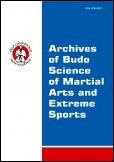2019, Volume 15, Issue 1
Reliability of the KK’017 questionnaire – test-retest military cadets
Ryszard Kałużny1, Elżbieta Kondzior2
1General Tadeusz Kościuszko Military University of Land Forces, Wroclaw, Poland
2Państwowa Szkoła Muzyczna I i II stopnia, Suwalki, Poland
Author for correspondence: Ryszard Kałużny; General Tadeusz Kościuszko Military University of Land Forces, Wroclaw, Poland; email: ryszard_kaluzny[at]op.pl
Full text
Abstract
Background & Study Aim: From the perspective of research methodology, simulation methods provide the greatest probability of predicting how a human will work in difficult and extreme situations. The main premise for the need to base the diagnosis of this category of activities on mixed assessments (praxeological and ethical) is the commonly perceived brutalization of interpersonal relationships. The purpose of the work is empirical verification of the reliability of the KK'017 questionnaire.
Materials & Methods: The KK’017questionnaire includes 12 statements (or questions) informing about hypothetical situations with its participation. The result of each respondent's declaration is based on one of four mixed assessments (conventional points, which simplifies statistical analysis): 3 (most socially desirable); 2 (does not compromise the hypothetical maker in an ethical sense but indicates a lack of efficiency); 1 (testifies to the effectiveness but disgraces the maker); 0 (informs about extreme social maladjustment). The test-retest method was used 14 days apart. Twenty-two military cadets (male) of the second year of study were tested, age 22.97 ±1.63 years.
Results: The KK’017 questionnaire reliability confirmed the following highest correlations: r = 0.822 for “jump into the water to save a drowning person”; r = 0.795 for “a serious accident on the road when the respondent is in a hurry for an important meeting”; r = 0.766 for “the need to help others”. Others from r = 0.761 to r = 0.556.
Conclusions: The test-retest results are empirical evidence that the KK'017 questionnaire meets the methodological criteria of the tool intended for simulation tests. Therefore, the recommendation of KK'017 for research on youth and adults is justified.
Key words: ethic, extreme situations, innovative agonology, mixed assessment, praxeology





